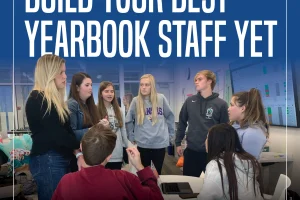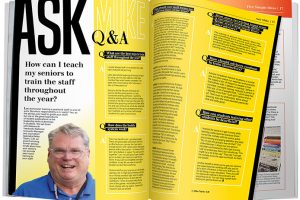
The Write Foot Forward
Preparing Middle School Students for High School
Middle school students are enthusiastic, energetic and ready to learn; however, they lack basic skills needed for high school journalism. These helpful tips will prepare students for the advanced journalistic writing they will encounter in high school.
Begin with Basics
Start with summary writing – who, what, when, where, why and how. Students often do not know where to start an article, but if they can write a story including these things and a quote or two, they are on the path to becoming excellent journalists.
Another basic skill middle schoolers must acquire is interviewing. I encourage students to begin with a simple, five-question format. Many of our interviews are conducted through email, so this makes for a manageable format. We learn how to professionally format emails, and I teach about open-ended questions that yield thoughtful responses and good quotes. I ask students to always end with a form of the question, “Is there anything else you’d like to share about this game/ season/experience?” That question often elicits the best responses because it is a catch-all for anything we may not have thought to ask!
Use your Resources
I use the Yearbook Suite curriculum Walsworth provides to teach my students the basics. My favorites include: “Writing Yearbook Captions that will Captivate” and “Photojournalism: Telling Stories with Images.” These units help us start the year strong.
Other resources I incorporate include: Idea File magazine, the Possibilities book, the “Inspiration” section at walsworthyearbooks.com, past yearbooks, advertisements and Pinterest. Walsworth also offers workshops that have been infinitely helpful for my staff. Through workshops, I have learned so much and seen what others have done successfully in their classes. Summer and fall workshops can give you and your students a great head start for the year.
Emphasize Editing
To emphasize the importance of editing, students review past books to find errors. It becomes evident which pages were heavily edited and which were done quickly.
After each page is complete and in proof, it is edited by three students before it gets to the editor. We can avoid errors with spelling and punctuation, incorrect names, spacing issues and awkward layouts when we have many eyes reviewing. Finally, I edit in the final stage using a classroom projector so all the students can see the updates. I point out common issues usually in the form of an inquiry. For example, “What do you think we could do to improve the awkward white space in this corner?”
Encourage teamwork
I encourage camaraderie among students. It takes a team to produce a yearbook, and if a few students don’t buy in, it affects the outcome of the book. I often pair students on assignments which helps avoid errors on the first draft. It doubles the number of interviews and there is a better chance of details being correct.
We have page submission days where the class reviews the final page, fixing any last-minute changes together. When a page is ready, we do a drumroll, submit the page and cheer when it is submitted. This class should be fun so when we meet our goals, we party! We often have a free day after stressful deadlines as a reward.
Connect with the High School Adviser
When it comes to preparing students for high school journalism, who better to turn to than the high school adviser? The high school yearbook adviser may have certain skills they’d like students to have that you may not have considered. You can find out what they will and will not be doing in a high school class so that you can adjust accordingly. You can plan meetings through the year to discuss coverage and progress.
Your class could even visit the high school for an educational experience. The high school adviser may want to recruit your passionate and talented students for the high school class! Communication with the high school adviser can be beneficial for both of you.
Conclusion
Although producing a yearbook is a daunting task, it is also extremely rewarding. Middle school students can work as a team to create something incredible that they will be proud of for years to come. Beginning with the basics, using the resources available to you, emphasizing the importance of editing, encouraging teamwork among the staff and communicating with the high school adviser are all ways that you can improve the quality of work in your class and prepare students for their future journalistic endeavors.
Tag:Middle School



